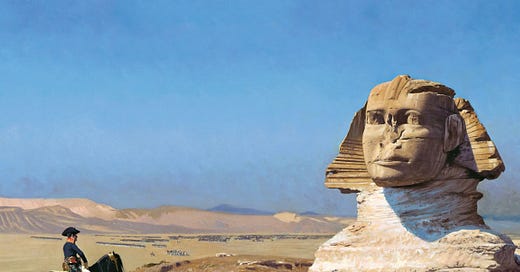When Napoleon invaded Egypt in 1798, he assembled the largest fleet to ever sail the Mediterranean. It consisted of over 38,000 soldiers, 13,000 sailors, and — true to the French spirit — 800,000 pints of wine.
But that isn’t what made the expedition unique. It was also, without a shadow of a doubt, history’s most literary invasion force.
125 unique books accompanied Napoleon on his journey to Egypt, and the chosen volumes provide a glimpse into the mind of history’s most enlightened emperor. The titles were arranged, by Napoleon himself, into six categories: Politics and Morality, Sciences and Art, Geography and Travels, History, Poetry, and Novels.
What was in the library? For starters, the French playwright Antoine-Vincent Arnault was tasked with collecting “plays from the Greeks, the Iliad, Odyssey, Shakespeare, Rabelais, Montaigne, Rousseau, and the elite of our moralists and novelists.” But that was just the beginning.
Works by Caesar, Tacitus, Plutarch, Livy, and Thucydides also accompanied the Emperor to Egypt, as did classic poems and plays by Homer, Ariosto, Tasso, Ossian, Virgil, Racine, and Molière. And of course, Napoleon wouldn’t have been caught dead without his beloved Sorrows of Young Werther (Goethe) or Esprit des Lois (Montesquieu).
Clearly, Napoleon had a voracious curiosity and vibrant intellectual life — but which of the books he read influenced him the most?
Today, we explore the authors who influenced Napoleon’s life and thought arguably more than any other. Commençons…
Keep reading with a 7-day free trial
Subscribe to The Culturist to keep reading this post and get 7 days of free access to the full post archives.





